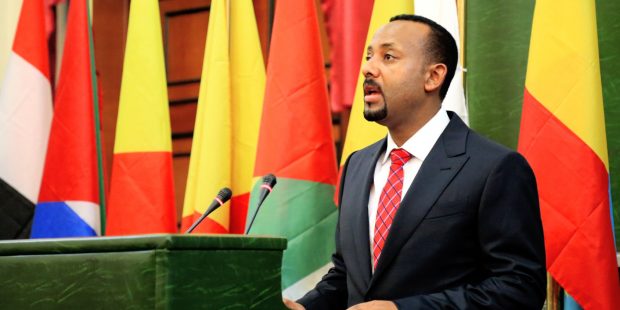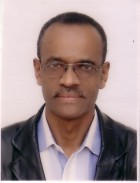Researching the politics of development
Blog

Not an ordinary speech: A reflection on the first speech of the new Prime Minster of Ethiopia
23 April 2018
Amdissa Teshome
An independent consultant and social science researcher, Amdissa Teshome reports from Addis Ababa with a fascinating insight into the inaugural speech of Ethiopia’s new Prime Minister.
Background to the speech
For the past four years in Ethiopia there have been unprecedented protests demanding political reform and fair utilisation of regional and national resources – mainly land. The protests were ignited in the Oromia region and spread to Amhara. The conflict along the borders of Ethiopian Somali and Oromia added to the already complex situation.
Unable to manage the crisis with the normal administrative and security systems, the government declared a state of emergency. This was for six months, from October 2016 to March 2017, and was then extended for a further four months. In August 2017 the state of emergency was lifted, but it was reinstated when the protests continued and there was concern that they were unfortunately taking ethnic dimensions.
But then on 15 February 2018, the Prime Minister of Ethiopia, Halemariam Dessalegn, resigned suddenly, two years in advance of the general election. This paved the way for a leadership contest amongst the four main parties that make up the Ethiopian People’s Revolutionary Democratic Front (EPRDF). Following weeks of discussion, negotiation and perhaps arm-twisting behind closed doors, EPRDF elected Dr Abiy Ahmed Ali from the Oromo People’s Democratic Organisation (ODPO) as chair of EPRD. This is the first time in 27 years that OPDO has had a leadership role. On 2 April 2018, Dr Abiy Ahmed was sworn into Parliament as Prime Minister and he delivered his first speech.
The opening of the speech – conventional
The speech opened in the conventional manner, addressing the Speaker of the House, Members, and guests of honour and remarking that it was a historic day for Ethiopia experiencing a peaceful transfer of power. The Prime Minister thanked Hailemariam for putting the country’s interest first and paving the way for this transition.
The body of the speech – major departure
Much of the public perception in local and international media was that the speech was very positive, in contrast to those in the past that focused on negative messages and treating the other side as the enemy of the nation. For the past 40 years, the Ethiopian public has been used to hearing a “zero sum” politics, i.e. if you are not with us, you are against us. Departing from this is unprecedented.
The Prime Minister referred to the “lost opportunities” of the past transitions. And there was a clear message that we should not repeat the same mistakes and make this transition a further lost opportunity.
The most striking section was the Prime Minister’s emphasis on unity. He went through historical records to state that Ethiopians from east to west, north to south and the centre were tied together with blood. He stated that each and every ethnic group has died for Ethiopia at Adwa, Karamara and Badme. Quoting an anonymous elder, he said: “We are Ethiopians when we live; we become Ethiopia when we die”.
Dr Abiy Ahmed also argued that Ethiopians are ahead of the rest of the world in exercising local democracy through the Oromo Gada system, soon to be recognised by UNESCO. But he also believes Ethiopia has fallen behind in its democracy recently. He has vowed to change that, with a statement that is, again, unprecedented in the Ethiopian Parliament. He no longer wishes to refer to the “opposition” as such, but as “competitors” who generate alternative ideas for the good of the country. He believes they are our brothers and sisters – the children of Ethiopia.
The uniqueness of the speech did not end there. The Prime Minister explicitly stated that the government should respect the rule of law, while at the same time maintaining law and order. He took the opportunity to apologise for the lives lost and the physical and psychological trauma the people of Ethiopia have suffered over the last few years.
The speech was also not entirely inward looking. The Prime Minister spoke of the importance of the Horn of Africa to Ethiopia with all its challenges and potential. He extended his arms to the Eritrean people and expressed willingness to talk for the good of the two people, who he said are tied together with blood. There were also special messages for the youth, women, the Ethiopian diaspora and development partners.
The closing of the speech – unconventional
The manner in which the Prime Minister ended his speech also received wide acclaim. He thanked his late mother for setting a vision for him at the age of seven that he would one day be in this position. The Prime Minister also thanked his wife. He elaborated on what he believes are the threefold responsibilities of wives in general – one to their husband, second to their children and third to the nation. He called upon all mothers to shape their children to be good citizens who can contribute to the development of the country.
Another striking closing statement was “Let the Creator bless Ethiopia and its people”. The last time the Creator was mentioned in the Ethiopian Parliament was probably by Emperor Haileselassie. Being a communist regime, it was unthinkable in Derg that any of its members, let alone Colonel Mengistu, would mention the Creator. By the same token, the Creator would not have been a phrase used in Parliament by the EPRDF regime.
Looking to the immediate future
The Prime Minister is widely expected to lift the state of emergency. He has recently announced his cabinet and has made specific reference to building a bureaucracy based on merit. For a Prime Minister whose first speech made his distinct approach apparent, this is yet another major departure from his predecessors. However, actions speak louder than words and he is yet to be tested on many fronts.

